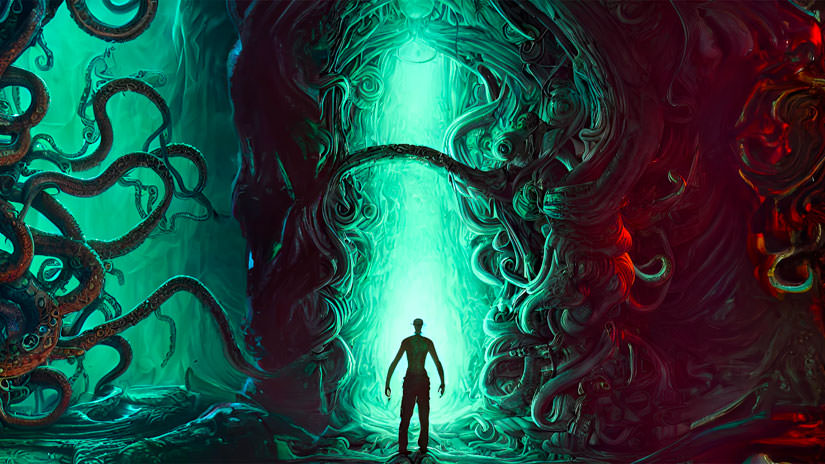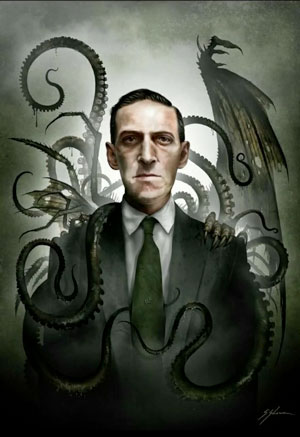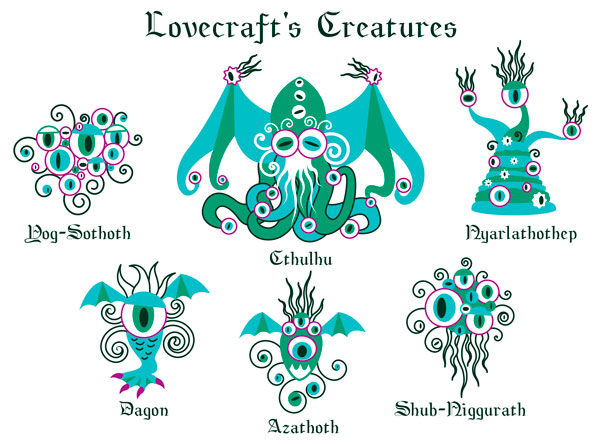
Welcome back, everyone! Last post I shared a little bit of my most recent project, a story set in SE Ohio during the '70s that had a "Lovecraftian" influcence. Since that post, I've had several people ask "What does that mean?" So this post is going to dive into who H.P. Lovecraft was and how he influenced horror! Let's go!
Who is HP Lovecraft?
 Howard Phillips Lovecraft, born in 1890 in Providence, Rhode Island, was a writer whose name has become synonymous with horror literature. His early life, fraught with health issues and family tragedies, shaped his reclusive personality and his penchant for the macabre. Lovecraft's career was mostly within the pages of pulp magazines like "Weird Tales", where he crafted tales not of ghouls or vampires, but of far more abstract and existential terrors.
Howard Phillips Lovecraft, born in 1890 in Providence, Rhode Island, was a writer whose name has become synonymous with horror literature. His early life, fraught with health issues and family tragedies, shaped his reclusive personality and his penchant for the macabre. Lovecraft's career was mostly within the pages of pulp magazines like "Weird Tales", where he crafted tales not of ghouls or vampires, but of far more abstract and existential terrors.
Style and Themes
Lovecraft's writing style is distinctive, often criticized for its verbosity, yet praised for its atmospheric depth. He employed an antiquated vocabulary, creating a sense of timeless horror. His stories frequently unfold through letters, diary entries, or first-person narratives, adding layers of mystery and unreliability.
Thematically, Lovecraft introduced the concept of cosmic horror: the idea that humanity is insignificant, surrounded by malevolent or indifferent ancient beings. His universe is one where knowledge can be dangerous, leading to madness or worse, as seen in stories like "The Call of Cthulhu" or "At the Mountains of Madness."
Impact on the Horror Genre
 Lovecraft's most significant contribution is the Cthulhu Mythos, a pantheon of deities and horrors that other writers have freely used, creating a shared universe that expands well beyond Lovecraft's own stories. This mythos popularized the concept of eldritch horror, where the fear stems from encountering realities beyond human comprehension.
Lovecraft's most significant contribution is the Cthulhu Mythos, a pantheon of deities and horrors that other writers have freely used, creating a shared universe that expands well beyond Lovecraft's own stories. This mythos popularized the concept of eldritch horror, where the fear stems from encountering realities beyond human comprehension.
His influence permeates modern horror literature. Stephen King cited Lovecraft as a significant influence, and authors like Neil Gaiman have woven Lovecraftian elements into their narratives, transforming horror from mere shock to an exploration of existential dread.
Movies and Books Influenced by Lovecraft
Movies:
- "Re-Animator" took Lovecraft's tale of scientific hubris into a campy, yet dark territory, becoming a cult classic.
- "The Dunwich Horror" brought to screen the terror of an invisible, monstrous entity, playing on Lovecraft's theme of unseen horrors.
- John Carpenter's "In the Mouth of Madness" captures the essence of Lovecraft's reality-bending horror without being a direct adaptation.
- "The Call of Cthulhu", a silent film, was a passion project that faithfully adapted Lovecraft's famous story, showcasing the cult interest in his work.
Books:
- August Derleth not only preserved Lovecraft's legacy but expanded it with his own stories, though he diverged by adding more structure to the mythos.
- Modern reimaginings, like Victor LaValle's "The Ballad of Black Tom", challenge and critique Lovecraft's often problematic racial views while embracing his horror elements.
Cultural Impact Beyond Literature
Lovecraft's themes have infested various media:
- Games: From the tabletop RPG "Call of Cthulhu" to video games like "Bloodborne," the essence of exploring forbidden knowledge at great personal risk is evident.
- Music: Bands have drawn inspiration from Lovecraft, with lyrics reflecting his cosmic despair.
- Art: Visual artists depict Lovecraftian horrors, translating his verbose descriptions into haunting visuals.
Conclusion
H.P. Lovecraft, despite his personal flaws, has left an indelible mark on horror, literature, and pop culture. His vision of a universe where humanity's place is both insignificant and precarious continues to resonate, inspire, and terrify. Lovecraft's work invites us to look beyond the veil of our perceived reality, into the abyss where, perhaps, it's better not to see at all. As we continue to reinterpret and expand upon his universe, Lovecraft's shadow over the genre of horror grows, proving that even from the depths, his influence on horror will echo through eternity.
Post Comments
No comments for this post
Recent Posts
Chapter 61: A Sneak Peek into 'Who Put Bella in the Wych Elm?' Chapter 60: Revealing the Cover of Who Put Bella in the Wych Elm? Chapter 59: ADHD + Self-Publishing = Creating a Publishing Company Chapter 58: Ooooooo, the new cover! Chapter 56: I've been quiet ... because ... Chapter 55: Haunted Objects-Do They Exist? Chapter 54: Urban Legends Unpacked - Examining the Truth Behind Local Ghost Stories Chapter 53: The Dark Side of History - Researching Real-Life Horrors for Inspiration Chapter 52: Celebrating One Year of Blogging Chapter 51: 'So Bad It's Good' Phenomenon - Celebrating Campy HorrorArchives
January 2025December 2024
September 2024
August 2024
July 2024
June 2024
May 2024
April 2024
March 2024
February 2024
January 2024
December 2023
November 2023
October 2023
September 2023
August 2023
July 2023